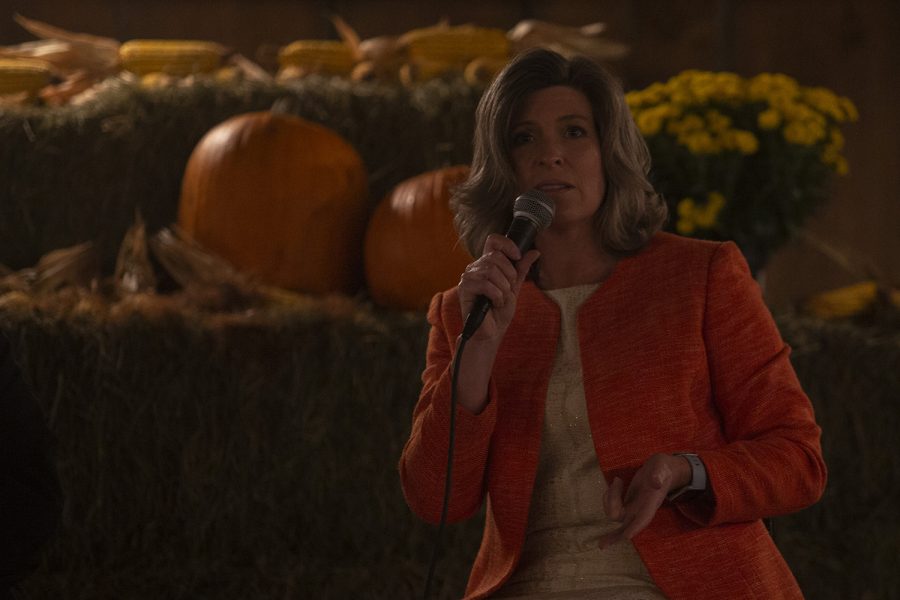Ernst, Democratic leadership fight over Violence Against Women Act
Negotiations on renewing the Violence Against Women Act have unraveled, with Iowa’s junior senator suggesting they came to a halt this week after U.S. Senate Minority Leader Chuck Schumer introduced the House Democrats’ version of the bill.
Sen. Joni Ernst, R-Iowa, talks about her personal struggles during the Iowa GOP Reception at Hughes Family Barn in Cedar Rapids on Friday, Oct. 18, 2019.
November 21, 2019
Sen. Joni Ernst, R-Iowa accused U.S. Senate Minority Leader Chuck Schumer of blocking bipartisan work on the 2019 Violence Against Women Restoration Act from coming to the Senate floor in a Nov. 21 conference call with reporters.
Ernst was working with Sen. Dianne Feinstein, D-Calif., on the law’s renewal for eight months in order for the legislation to make it through the House and Senate before negotiations unraveled. On Tuesday, Feinstein introduced a version of the bill similar to one passed through the House in April that the entire House Democratic caucus sponsored. However, Ernst introduced her own version Wednesday, saying she believed the Democrats’ bill would likely not receive the 60 votes needed in the Senate with a gun purchasing restriction included.
“After months of work and mountains of effort went into working toward a bipartisan bill, at some point, someone pressed the big red button of partisan politics and the Democrats refuse to work together any longer, walking away from the real progress we made,” Ernst said in the Thursday conference call.
Feinstein’s office released a statement on Nov. 13 that called the House version of the act a strong bill that was supported by 33 House Republicans. She said in the statement that there should be no reason why the bill wouldn’t get the same support in the Senate.
“I’ve been working with Senator Ernst on a bipartisan path forward and plan to continue those negotiations,” Feinstein said in the statement. “Given the overwhelming House vote and the strength of that bill, however, now is the right time to introduce it.”
Approaching gun violence in the legislation has been a point of contention on the act between Republicans and Democrats. Democrats want to close what they call the “boyfriend loophole,” referring to those with misdemeanor stalking and domestic-violence charges being able to legally purchase guns. The Democrats’ House version of the bill adds those convictions to a list of other felonies and misdemeanors that would bar someone from buying a gun.
Ernst said U.S. Senate Majority Leader Mitch McConnell wants to see continued collaboration between Ernst and Feinstein and reach a resolution.
“And we actually had come very, very close to language that would be acceptable to both Republicans and Democrats,” Ernst said, referring to her work with Feinstein. “But unfortunately, a foot was put down and Dianne was told to introduce the House version of the bill, and to not work with me anymore, so she did walk away.”
Ernst said on the call that changing people’s assault charges to felony charges that could have happened 30 to 40 years ago takes away someone’s right to due process. She said her and Feinstein were arriving on language that would have addressed fewer restrictions on gun purchases for offenders in dating relationships, and that change would take place from this bill forward. The House version makes that provision retroactive.
Ernst’s version of the bill increases funding by 10 percent, which she says would triple the support for programs relating to rape prevention and education and bolster housing opportunities to victims. Funding for housing would also be put toward women and children in rural areas where shelters can sometimes be hours away. This funding also extends to those living in tribal communities.
The bill also “holistically addresses the issue of female genital mutilation or cutting” which includes the Federal Prohibition of Female Genital Mutilation Act of 2019. The act amends a constitutional defect by implementing a federal statute banning genital mutilation and cutting.
Ernst publicly went through a divorce earlier this year, involving allegations of domestic violence against her ex-husband. Ernst said this bill was a priority for her this year, and the 10 percent increase in federal funding is important to her.
“I do not need to be mansplained by Chuck Schumer,” Ernst said. “You know, I am a survivor. I’m not afraid of anyone, folks. I have been through the worst of the worst, and I’m here today. So Chuck Schumer can just take his comments — it’s all political for Chuck Schumer, it’s all political for Chuck Schumer.”
Ernst is running for reelection for her U.S. Senate seat in 2020, a race which the Cook Political Report rated as “likely Republican.”



